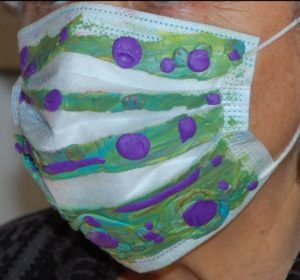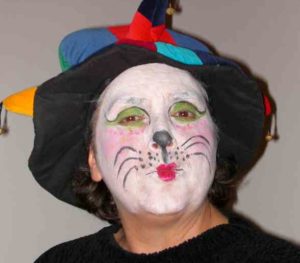
Art Therapy
“One of the basic rules of the universe is that nothing is perfect. Perfection simply doesn’t exist…..Without imperfection, neither you nor I would exist” ― Stephen Hawking



 The instructions were to use strips of masking tape to secure the windows. Prepare the “safe room” with emergency provisions, snacks, games, a portable radio, a pail of water, and rags to place under the door in order to prevent the poison gas from entering the room. The most important item to have on hand was the box containing the mask and the EpiPen antidote injection: an ugly cardboard box, with a plastic black strap which people had to carry everywhere they went. This was the scene exactly 30 years ago in Israel during what is known as the Gulf War. There was no lockdown, the schools were open, citizens continued their daily life, but the tension mounted, and the anxiety was palpable. There certainly was confusion. Confusion in the instructions, and tense anticipation for the sirens to announce another Scud missile being launched from Iraq at Israel, hitting an apartment building on the outskirts of Tel Aviv or the area of the coast near Haifa. 77 people died during that 41-day war, all but 3 of them from heart attacks.
The instructions were to use strips of masking tape to secure the windows. Prepare the “safe room” with emergency provisions, snacks, games, a portable radio, a pail of water, and rags to place under the door in order to prevent the poison gas from entering the room. The most important item to have on hand was the box containing the mask and the EpiPen antidote injection: an ugly cardboard box, with a plastic black strap which people had to carry everywhere they went. This was the scene exactly 30 years ago in Israel during what is known as the Gulf War. There was no lockdown, the schools were open, citizens continued their daily life, but the tension mounted, and the anxiety was palpable. There certainly was confusion. Confusion in the instructions, and tense anticipation for the sirens to announce another Scud missile being launched from Iraq at Israel, hitting an apartment building on the outskirts of Tel Aviv or the area of the coast near Haifa. 77 people died during that 41-day war, all but 3 of them from heart attacks.
I came to Israel for a conference in mid-December of that year, and intended to stay for a number of weeks longer to visit family. When tensions mounted, I decided to stay and do what I could to help in the situation. I traveled around the country and offered workshops for therapists dealing with their frustrations and difficulties. On one of these occasions I was visiting Haifa, and stayed overnight at the home of then chief Rabbi of Haifa Rabbi Shear Yishuv Cohen of blessed memory (OBM) and his wife, my dear friend Naomi OBM. Around 9pm there was a siren, and we all had to go into the safe room, which in their home was the bedroom. We all donned our masks and heard the whoosh of the missile, and a short time later the all-clear. Both Naomi and I went into the kitchen to prepare some tea, which was their custom now after each all-clear. This was the first time I saw her with her own hair (without head covering), and I started laughing at our role-reversal. A strange sight of me with my head covered by a hat, and her with a bare head. To my comment about the situation, she declared: “This is totally appropriate. I am his wife, he can see me like this, but you need to cover your hair out of respect.”
The next morning, I traveled by train to Tel Aviv, intending to take a bus to my sister’s kibbutz in the south, close to Be’er Sheva, where I had a workshop to deliver the following evening. I was traveling with a small suitcase, my big black briefcase, the mask box, my cane, and an umbrella. I took off my coat, opened the briefcase, and worked on the materials for the workshop. Noticing that we were almost at the station, I closed the briefcase, placed it on the seat beside me, put on my coat, picked up my suitcase, mask box, umbrella, oh yes, my cane, and proceeded to exit the train and the station. It was pouring rain, and I hailed a cab, which had other passengers already in it, but seeing me with all my paraphernalia he stopped, put my suitcase in the trunk and let me sit in front. We were on our way to the bus station when I suddenly realized my briefcase was missing. The driver assured me he did not place it in the trunk, so the only conclusion we could reach was that it had stayed on the train. I asked him to turn around and go back so we could retrieve it, saying that I hoped no one stole it. The other passenger and the driver started to laugh. “Lady,” they said, “you will be lucky if they did not blow it up yet.” I was horrified, remembering all the incidents about “suspicious objects,” some of them real explosive devices, others innocent grocery bags left inadvertently on the side of the road and exploded by the special unit of the police. We let the other passenger off at his destination, and turned around to go back to the train station.
As we approached, we saw the entire front of the station cordoned off by police and army with guns at the ready. When I approached and asked innocently if anyone saw a black briefcase, the guard looked at me menacingly and talked into his radio “I think I have the lady, call off the demolition unit.” I was escorted between 2 soldiers, through an angry crowd of passengers who had been detained and not allowed to get to the train. When we reached the train, I was so happy to see my briefcase that I smiled and said “oh thanks, that is my briefcase indeed!” No one smiled back. I was ordered to mount the stairs on my own, go to the briefcase and open it to make sure it did not explode. I was given a stern talking-to about the irresponsible person I was to leave something behind, and to cause all the unnecessary delays, anxiety and expense. “If you were not such a respectable-looking lady, we would have arrested you and fined you. Now scat.” I was truly shaken up, and when I got back to the lovely taxi driver who waited for me, I told him “never mind the bus station, take me all the way to my sister’s kibbutz no matter the cost”. It took me the entire 2-hour drive to calm down, and to realize I was in a war zone.
The next evening, I gave my workshop in Be’er Sheva. There were more than 20 therapists present, and what I heard then was not much different from what I hear today, 30 years later, from therapists working with a population in lockdown: uncertainty, anxiety and exhaustion. That was the first time I realized that a therapist working in the community where she is as exposed to the trauma as everyone else carries an extra burden that needs to be addressed. The interventions I teach today are based on what I learned then. Much of the resistance and anger at the authorities for confusing and inconsistent messages are reflected onto the object of the mask, the vaccine, or needle – anything that represents lack of control and having to obey authority. Therefore, using those objects and changing their valence was my aim: to befriend, rather than reject. The mask of 30 years ago was carried by children and adults in identical boxes, and had to be placed near the entrance of the classroom in case a swift evacuation was needed. Needless to explain the confusion and chaos when children had to find “their” mask. Therefore at the workshop, besides dealing with fear, anger, and frustration with members of the family and the public who refused to don the mask (and thus served as bad role models for the children), we decorated mask boxes. Basically, we created a personalized fashion item out of an ugly and hated cardboard box. This also resulted in a feeling of empowerment, of being able to use creative energy instead of feeling defeated. 
In spite of the current situation appearing different (a worldwide pandemic rather than a local war), the challenges are somewhat similar. Again we are faced with chaos, uncertainty, and the need to follow instructions from the authorities. The situation is worsened by the isolation and deaths of loved ones, especially in assisted-living facilities where they are not able to have the physical contact they need with loved family members. There is also the same frustration and anger at the lack of support from a segment of the population that refuses to wear masks and follow social distancing. The masks are different (no longer cumbersome big boxes to carry), but the symbolic image is the same. Besides the self-care radical compassion workshop that I gave on Zoom, of course, I also used the idea of befriending the enemy, and created a workshop in which participants used unusual materials to create their “Power Masks.” One of these workshops took place with young adults, recent immigrants to Canada, who felt especially vulnerable because of the traumas they experienced and the new culture they had to adjust to. The change I saw when they moved from discussing difficulties and bringing up their feelings of helplessness to creative expression was amazing. The permission to play, the ability to express without words, to create something they could be proud of, brought about a real transformation. Play is one of the most important elements in maintaining wellbeing. In play and imagination, we forget ourselves, shifting into a dimension in which almost anything is possible. We can simultaneously hold two positions. As a result, we can at once be both in control and out of control. “During play our body is fully engaged within the world. While we are totally engaged within the world, our sense of belonging increases and we feel once again at-home within our body. Simply put, this means that we are no longer terrified of our own bodily feelings but rather allow our body to explore the environment.” (Dr. Mooli Lahad) We all need to remember the joy and curiosity with which we faced the world as children, until we were told to buckle down and be serious. Now seriously, if we are not curious, if we do not investigate or use creative playfulness, laughter, and joie de vivre, we can never
 be truly alive.
be truly alive.